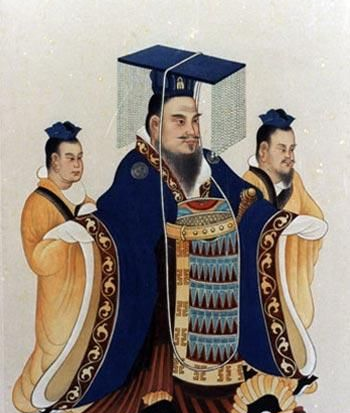Han Wudi (157 B. C.--87 B. C.) was originally named Liu Che.
汉武帝,名刘彻,生于公元前157年,卒于公元前87年。
He came to the Han throne at the age of 16 but did not take the government into his own hands until 131 B. C.
武帝16岁登上帝位,但是直到公元前131年才执掌朝政。
He was firmly determined to wield imperial power to a greater extent than any of his predecessors in the (Former) Han Dynasty had done.
武帝支配皇权的决心比以往任何一位汉代皇帝都大。

In his administration of justice,for example,all but one of his seven prime ministers between 121 and 88 were convicted of crimes and met violent deaths.
比如,在执法方面,公元前121年至公元前88年,武帝的7位承相中有6位被判罪处死。
The numerous laws were harshly applied throughout the empire,thus creating a style of government unknown among his Han predecessors but strikingly similar to that of Qin Shi huang-ti.
数目众多的法律在全国范围内得到严格的应用。这样,武帝创造出一种不同于前几位汉代皇帝,却与秦始皇惊人地相似的统治风格。
Wudi (meaning “martial emperor") was a well-deserved title.
武帝这个称号真是名副其实。
His campaigns toward the southeast,into the coastal regions,determined in large part the southern boundaries of China.
武帝往东南攻至沿海,基本上确定了中国南部的边界。
His conquests along China's northern frontiers,if less permanent,were even more impressive.
武帝对北方的征服可能不是那么长久,但是却更加令人难忘。
After a costly series of wars he drove the nomadic Hsiungnu north as far as the Gobi Desert in 119 B. C.
经过一系列开销巨大的征战之后,武帝于公元前119年把匈奴人赶到了戈壁沙漠。
By 104 B. C. Emperor Wu's military might had reached beyond the Pamir Mountains to Russian Turkistan.
到公元前104年,武帝的武力越过帕米尔群山,抵达俄属士耳其斯坦。
Similarly. The empire that Wu-ti created,surpassing in size the contemporary Roman Empire,was the greatest in the world.
汉武帝创建的帝国比同时期的罗马帝国还要大,是当时世界上最大的帝国。
When Emperor Wu came to the throne,the Han Dynasty was financially very strong.
汉武帝登基时,汉朝经济力量非常强大。
But his wars were terribly costly. So too were construction projects that he initiated.
但是武帝打仗的花费同样惊人的,发起的建设工程的花费也是惊人的。
Expenses were met by a variety of means.
武帝通过各种手段筹集费用。
The tight net of the law meant that the government could remit punishments for cash or goods and thus add to the state's coffers.
严格执法意味着犯人可以交钱或货物来获得较轻的处罚,甚至得以无罪释放,这样国库就又有了补充。
Those without money were condemned to penal servitude as soldiers or laborers.
那些没钱的罪犯被判以充军或服劳役的刑罚。
Although new taxes were created and old ones increased,there was still not enough money.
尽管开征了新税,加重了旧税,钱还是不够。
Hence,salt, iron,and liquor were made state monopolies.
所以,国家就垄断了盐、铁和酒的经营。
These measures produced widespread discontent and some uprisings.
这些措施引起了广泛的不满和一些起义。
By the end of Wu-di's reign the finances of the empire had been badly strained,and his successors had to institute ameliorative policies.
到了汉武帝统治末期,帝国财政非常紧张。后代君主不得不制定改善措施。
Emperor Wu is also famous for granting exclusive recognition to Confucianism as the official state philosophy.
汉武帝还因尊儒而闻名。
Soon after he ascended the throne,he ordered that students of the Legalist philosophy,which had been the dominant school of thought in the Qin period,be banished from the government.
法家思想在秦朝居于统治地位。武帝继位不久即把法家学派的学者驱逐出政府。
In 135 B. C. he established the Office of Erudites for the five Confucian classics. The Erudites served as advisers to the Emperor and as teachers of future officials.
公元前135年,武帝设立五经博士,博士们担任皇帝的顾问和未来官员的教师。
The office was not new; there had earlier been Erudites for the Confucian classics,but Wu-di's decree meant that from then on there would only be Confucian Erudites.
这种学校以前也有。以前也有博士,但是武帝的法令意味着从此以后只能有儒家的博士。
Eleven years later he founded the Imperial University,where the Erudites taught the better students.
11年后,武帝设立太学。博士们有了更好的学生。
It is difficult to overemphasize the importance of these decisions.
这些决定怎么强调都不为过。
From this time on,for over 2 000 years,men who wanted to become officials were expected to study the Confucian classics.
从此以后,2000多年里,想做官的人一定要读儒家经典。
Although the results of these policies were not immediate,they are of the most profound signiflcance to all later Chinese history.
尽管这些政策的影响并非立竿见影,但是它们对后来所有的中国历史产生了最为深远的影响。


